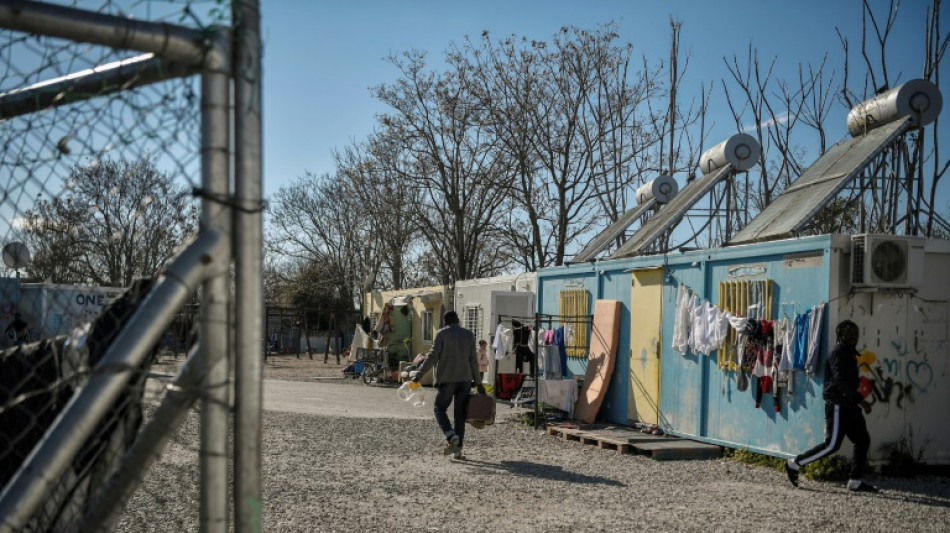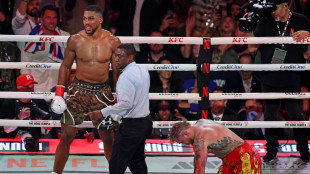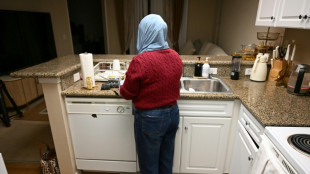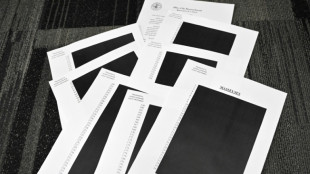
-
 England 'flat' as Crawley admits Australia a better side
England 'flat' as Crawley admits Australia a better side
-
Australia four wickets from Ashes glory as England cling on

-
 Beetles block mining of Europe's biggest rare earths deposit
Beetles block mining of Europe's biggest rare earths deposit
-
French culture boss accused of mass drinks spiking to humiliate women

-
 Burning effigy, bamboo crafts at once-a-decade Hong Kong festival
Burning effigy, bamboo crafts at once-a-decade Hong Kong festival
-
Joshua knocks out Paul to win Netflix boxing bout

-
 Dogged Hodge ton sees West Indies save follow-on against New Zealand
Dogged Hodge ton sees West Indies save follow-on against New Zealand
-
England dig in as they chase a record 435 to keep Ashes alive

-
 Wembanyama 26-point bench cameo takes Spurs to Hawks win
Wembanyama 26-point bench cameo takes Spurs to Hawks win
-
Hodge edges towards century as West Indies 310-4, trail by 265

-
 US Afghans in limbo after Washington soldier attack
US Afghans in limbo after Washington soldier attack
-
England lose Duckett in chase of record 435 to keep Ashes alive

-
 Australia all out for 349, set England 435 to win 3rd Ashes Test
Australia all out for 349, set England 435 to win 3rd Ashes Test
-
US strikes over 70 IS targets in Syria after attack on troops

-
 Australian lifeguards fall silent for Bondi Beach victims
Australian lifeguards fall silent for Bondi Beach victims
-
Trump's name added to Kennedy Center facade, a day after change

-
 West Indies 206-2, trail by 369, after Duffy's double strike
West Indies 206-2, trail by 369, after Duffy's double strike
-
US strikes Islamic State group in Syria after deadly attack on troops

-
 Epstein files opened: famous faces, many blacked-out pages
Epstein files opened: famous faces, many blacked-out pages
-
Ravens face 'special' Patriots clash as playoffs come into focus

-
 Newly released Epstein files: what we know
Newly released Epstein files: what we know
-
Musk wins US court appeal of $56 bn Tesla pay package

-
 US judge voids murder conviction in Jam Master Jay killing
US judge voids murder conviction in Jam Master Jay killing
-
Trump doesn't rule out war with Venezuela

-
 Haller, Aouar out of AFCON, Zambia coach drama
Haller, Aouar out of AFCON, Zambia coach drama
-
Nasdaq rallies again while yen falls despite BOJ rate hike

-
 Bologna win shoot-out with Inter to reach Italian Super Cup final
Bologna win shoot-out with Inter to reach Italian Super Cup final
-
Brandt and Beier send Dortmund second in Bundesliga

-
 Trump administration begins release of Epstein files
Trump administration begins release of Epstein files
-
UN Security Council votes to extend DR Congo mission by one year

-
 Family of Angels pitcher, club settle case over 2019 death
Family of Angels pitcher, club settle case over 2019 death
-
US university killer's mystery motive sought after suicide

-
 Rubio says won't force deal on Ukraine as Europeans join Miami talks
Rubio says won't force deal on Ukraine as Europeans join Miami talks
-
Burkinabe teen behind viral French 'coup' video has no regrets

-
 Brazil court rejects new Bolsonaro appeal against coup conviction
Brazil court rejects new Bolsonaro appeal against coup conviction
-
Three-time Grand Slam winner Wawrinka to retire in 2026

-
 Man Utd can fight for Premier League title in next few years: Amorim
Man Utd can fight for Premier League title in next few years: Amorim
-
Pandya blitz powers India to T20 series win over South Africa

-
 Misinformation complicated Brown University shooting probe: police
Misinformation complicated Brown University shooting probe: police
-
IMF approves $206 mn aid to Sri Lanka after Cyclone Ditwah

-
 Stocks advance as markets cheer weak inflation
Stocks advance as markets cheer weak inflation
-
Emery says rising expectations driving red-hot Villa

-
 Three killed in Taipei metro attacks, suspect dead
Three killed in Taipei metro attacks, suspect dead
-
Seven Colombian soldiers killed in guerrilla attack: army

-
 Amorim takes aim at Man Utd youth stars over 'entitlement'
Amorim takes aim at Man Utd youth stars over 'entitlement'
-
Mercosur meets in Brazil, EU eyes January 12 trade deal

-
 US Fed official says no urgency to cut rates, flags distorted data
US Fed official says no urgency to cut rates, flags distorted data
-
Rome to charge visitors for access to Trevi Fountain

-
 Spurs 'not a quick fix' for under-fire Frank
Spurs 'not a quick fix' for under-fire Frank
-
Poland president accuses Ukraine of not appreciating war support


Who will take 30,000 asylum seekers? EU solidarity faces big test
The EU's new migration pact faces its first real test in coming months as countries are called to split the "burden" of resettling at least 30,000 asylum seekers -- with a Christmas deadline to strike a deal.
The European Union's 27 states last year struck a landmark agreement that hardens border procedures, envisages accelerated deportations and overhauls how the bloc deals with asylum seekers.
The deal will fully enter into force in 2026. But talks on its so-called "solidarity mechanism" are set to begin in October -- and dominate the agenda in the coming weeks.
Seeking to "ensure fair burden sharing" between countries along migration routes, such as Greece or Italy, and the rest of the EU, the pact requires other member states to take in a certain number of asylum seekers.
States that fail to do so must make a financial contribution of 20,000 euros ($23,400) per asylum seeker to the countries under pressure.
The rules stipulate that there must be at least 30,000 relocations every year.
- 'Politically complicated' -
"From a logistical point of view, it's quite easy to take 1,000 people from another country: you send buses, planes," said a European diplomat.
But for the EU's member states -- facing a febrile political climate and rising anti-immigrant sentiment -- the decision to step up is about more than just logistics.
"It's politically that it's very complicated," the diplomat said.
This issue is "more difficult than anything else", said an EU official, pointing to US President Donald Trump's virulent criticism last week at the United Nations of Europe's migration policy as heaping more pressure on the EU.
"Perhaps we should remind member states that they negotiated this text," EU lawmaker Fabienne Keller told AFP.
"The whole point of this new system is to look at the figures objectively, without getting into populist rabble-rousing," said the centrist MEP, who pushed the vast migration reform through the European Parliament.
- States under pressure -
Member states' discussions on how to implement the new system are expected to run until the end of the year.
The first step will be a list. The European Commission will determine by October 15 which EU states face "migratory pressure" based on criteria including the number of irregular arrivals and the size of the country.
Such is the sensitivity of the issue, that even the method for deciding which countries has been the subject of debate.
Once they get over this hurdle, member states will then discuss how many migrants each they are willing to "relocate" to their territory, or what financial support they are willing to provide instead.
There will be several rounds of talks before a final decision, expected by the end of year.
Alongside this, EU states are working hard to increase the return of people whose asylum applications have been rejected.
Of those ordered to leave the bloc, only around 20 percent are actually returned -- a figure often wielded by critics calling for a harder line on migration.
The EU is at present considering three proposals to tighten current rules.
If adopted, these measures would allow member states to open centres outside of the EU where they can send migrants whose asylum applications have been rejected, so-called "return hubs".
Member states hope to reach an agreement on the issue also by Christmas.
O.Johnson--AMWN